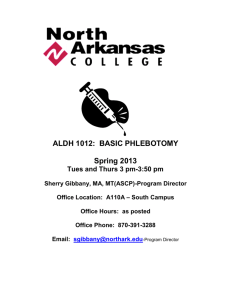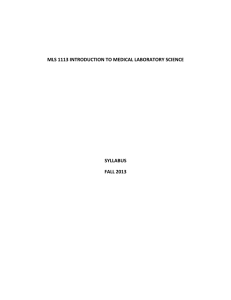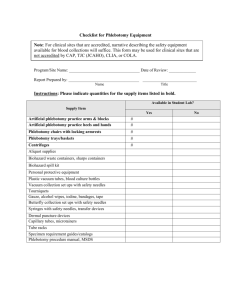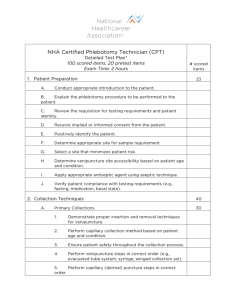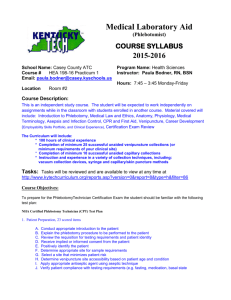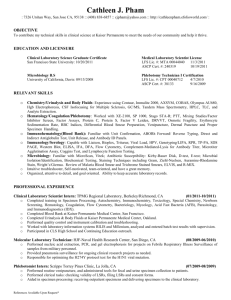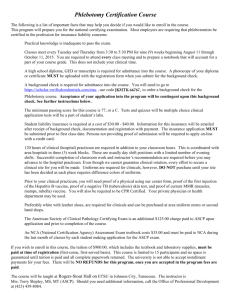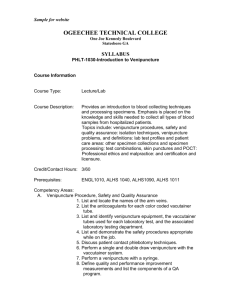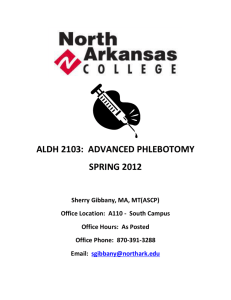ALDH 1013: BASIC PHLEBOTOMY Fall 2013 Tues and Thurs 3 pm
advertisement
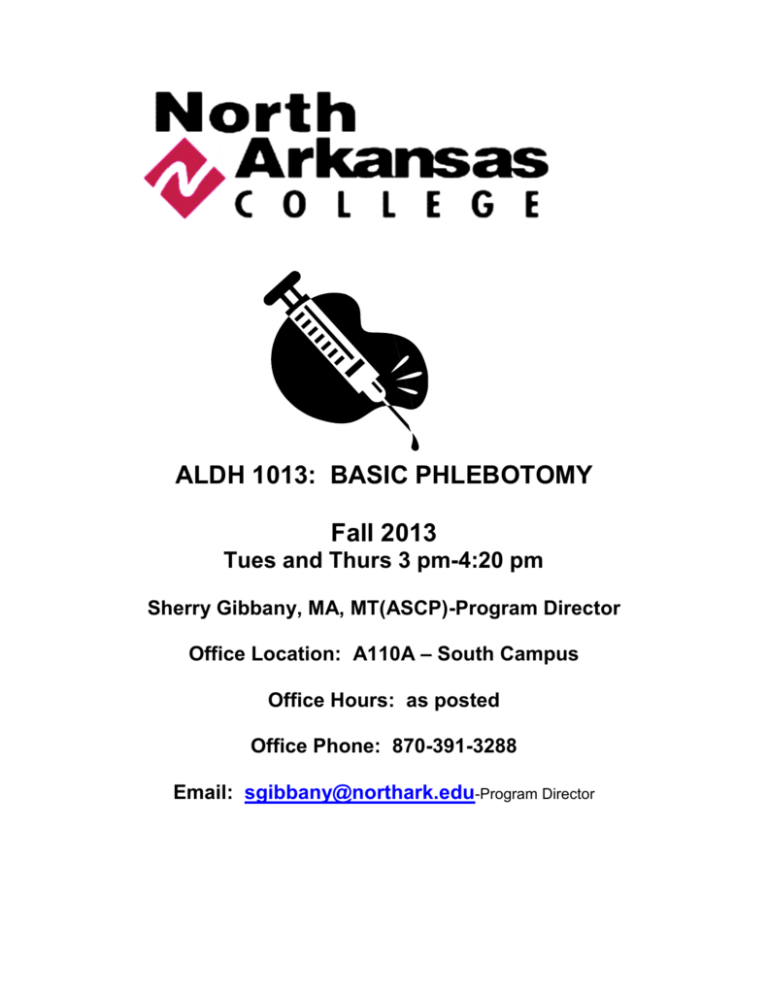
ALDH 1013: BASIC PHLEBOTOMY Fall 2013 Tues and Thurs 3 pm-4:20 pm Sherry Gibbany, MA, MT(ASCP)-Program Director Office Location: A110A – South Campus Office Hours: as posted Office Phone: 870-391-3288 Email: sgibbany@northark.edu-Program Director NORTH ARKANSAS COLLEGE Harrison, Arkansas ALDH 1013: BASIC PHLEBOTOMY 3 credits Dates: Fall 2013 Times: Tues and Thurs- 3 pm – 4:20 pm Instructor: Sherry Gibbany, MA MT(ASCP) Office: South Campus, Room A110A Office Hours: As posted Office Phone: 870-391-3288 Email Address: sgibbany@northark.edu Course Description: This course includes lectures and student laboratories covering the principles and techniques of specimen collection particularly blood collection by venipuncture and micro-sampling utilizing various types of collection apparatus. Prerequisites: Enrollment in Allied Health Program (MLT, RT, RN, PN, EMS, Surg Tech) or approval of instructor. Textbooks: McCall, Ruth E., and Cathee M. Tankersley, Phlebotomy Essentials, 5th ed., Lippincott/Williams & Wilkins, 2012. References Hoeltke, Lynn, The Complete Textbook of Phlebotomy, 3rd. Ed., Delmar Learning, 2006. Garza, Diana and Kathleen Becan-McBride, Phlebotomy Handbook, Blood Collection Essentials, 7th Ed. Prentice Hall 2005 Kalanick, Kathryn, Phlebotomy Technician specialist, A Practical Guide to Phlebotomy, Delmar Learning, 2004. Selected Video Tapes: Bloodborne Pathogens, ASCP Press, 1991. Blood Collection: The Difficult Draw, ASCP Press, 1992. Blood Collection: The Pediatric Patient, ASCP Press, 1990. Blood Collection: The Routine Venipuncture, ASCP Press, 1989. Blood Collection: The Special Procedures, ASCP Press, 1991. Basic Venipuncture, Center for Phlebotomy Education, 2004. Preventing Preanalytical Errors, Center for Phlebotomy Education, 2004. Basic Venipuncture, Center for Phlebotomy Education Break the Chain 2002, Terra Nova Films White Blood Cell Video Teaching Methodologies: Lecture, class discussions, audio-visual presentations, student laboratory practice, PowerPoint. Behavioral Objectives: Upon completion of this course, the student will be able to: 1. Describe the basic anatomy and physiology of the circulatory system. 2. Explain the equipment used in phlebotomy and when given equipment, how to properly set-up when preparing to perform a venipuncture or a capillary puncture on a patient. 3. Describe necessary safety techniques used in Phlebotomy and other areas of the hospital to insure Universal Precautions are being followed and to prevent infection caused by bloodborne and other pathogens. 4. Describe proper phlebotomy techniques including challenges of phlebotomy, specimen considerations, and special procedures. 5. Discuss common test tubes used in obtaining a specimen of blood: a. additive(s) in each tube b. whether each tube produces serum or plasma c. tests that cannot be performed on the specimen in each tube and why d. common tests performed on each tube e. order of draw tubes f. department of laboratory where tube most commonly used 6. Explain professionalism as it relates to Phlebotomy. 7. Successfully complete all tasks required under “Psychomotor Objectives.” 8. Describe proper procedure for performing a capillary puncture. Terminal Psychomotor Objectives: Those objectives marked with a “ * “ must be successfully completed as written for the student to pass ALDH 1012. 1.* Perform a venipuncture correctly under the direct observation of the instructor. 2.* Properly prepare a phlebotomy site for the collection of a blood culture/unit of blood. Methods of Evaluation: Lecture quizzes/assignments Lecture tests Laboratory participation and completion of all exercises Laboratory practical examinations/assignments/quizzes Final examination All assignments, tests, quizzes, and practicals will be graded on a point basis. Final grades will be determined by total points accumulated in both lecture and laboratory sessions. Grading Scale: A = 90-100.0% B = 80 – 89.99% C = 70 – 79.99% D = 60 – 69.99% F = below 60.0% MISCELLANEOUS Attendance In accordance with the attendance policy outlined in the college catalog, students are expected to attend all class meetings. Any penalties for absences may be left to the discretion of the instructor. It is the responsibility of the faculty members to advise their classes, in writing, of their attendance policy. It is the student’s responsibility to drop the class if they no longer choose to attend. My policy is that you are in this class for a reason and therefore, as an adult, it is your responsibility to be in class or to go through the proper channels to withdraw from the course. If you have an excused absence please inform the instructor. It is the responsibility of faculty members to advise their classes, in writing, of their attendance and makeup policies. It is the student’s responsibility to discuss any absences and the possibility of makeup work with the instructor as soon as possible. Students are expected to attend all class meetings and officially withdraw from courses they are no longer attending. However, if students fail to withdraw, their instructors will not allow them to remain on class rolls when it becomes clear that excessive absences prevent the student’s successful completion of the course. Once an instructor has determined that a student has missed too many classes to pass the course, the instructor will officially withdraw the student rather than allowing the student to remain on the class roll and receive an “F” at the end of the semester. As a general rule, missing more than 15% of scheduled class meetings (six class hours in a traditional three credit lecture course, proportionately more in classes with laboratory, studio, or clinical components) constitutes excessive absence. In online classes, a student’s failure to participate for a period greater than two weeks constitutes excessive absence. Instructors in online courses will monitor attendance based on participation in the class as evidenced by turning in assignments, participation in discussion boards, e-mail, or other formal contact. Students must consult the course syllabus for the attendance policy set by individual instructors. Feel free to have a classmate to tape the lecture if an absence is necessary. Have a classmate turn in any assignments that may be due that day. A student will be allowed to miss one test only and if a test is missed from any component of this course, due to illness or other reason, it MUST be made up by the next class session, prior to class. All missed tests are placed in the testing center the morning following the test and picked up just before the following week’s class. Should you fail to take an examination prior to the next class it will be given a grade of zero (0). If for any reason a curve is given on a test, it will not be given to students that have taken a make up test. All assignments must be turned in on time. NO LATE ASSIGNMENTS, WHAT-SO-EVER, WILL BE ACCEPTED. A grade of zero (0) will be given to any assignments not turned in on the due date. If a student is going to have to miss class for whatever reason, the student can email, have the assignment hand delivered or faxed to the instructor. THIS POLICY WILL BE STRICTLY ADHERED TO. Tardiness Policy I am not strict on this except for laboratory. I feel that part of a lecture is better than no lecture at all. But if it becomes habitual then I may discuss the continuous tardiness with the student. PLEASE DO NOT MAKE IT A HABIT BECAUSE IT IS DISRUPTIVE TO THE CLASS AS A WHOLE. BE COURTEOUS TO YOUR FELLOW STUDENTS. Academic Dishonesty & Integrity Academic dishonesty is defined page 64 of the 2012-2013 Catalog. If I suspect cheating or copying of each other’s papers has occurred, I will act in accordance with the guidelines stated in the Student Handbook and Catalog. The proper steps for a student to resolve disciplinary action are as follows: 1. Instructor 2. Division Chair 3. Vice-President of Learning 4. Institutional Standards and Appeals Committee. Note The stated schedules – lectures and laboratory – are subject to change in the event of extenuating circumstances such as weather or unavailability of equipment or reagents. Student Responsibilities Read the college catalog and all materials you receive during registration. These materials tell you what the college expects from you. Read the syllabus for each class. The syllabus tells you what the instructor expects from you. Attend all class meetings. Something important to learning happens during every class period. If you must miss a class meeting, talk to the instructor in advance about what you should do. Be on time. If you come in after class has started, you disrupt the entire class. Never interrupt another class to talk to the instructor or a student in that class. Be prepared for class. Complete reading assignments and other homework before class so that you can understand the lecture and participate in discussion. Always have pen/pencil, paper, and other specific tools for class. Learn to take good notes. Write down ideas rather than word-for-word statements by the instructor. Allow time to use all the resources available to you at the college. Visit your instructor during office hours for help with material or assignments you do not understand; use the library; use the free tutors, tapes, computers, and other resources in Learning Assistance Center. Treat others with respect. Part of the college experience is being exposed to people with ideas, values, and backgrounds different from yours. Listen to others and evaluate ideas on their own merit. Accommodations for Students with Special Needs: North Arkansas College complies with Section 504 of the Rehabilitation Act of 1973 and the Americans with Disabilities Act of 1990. Students with disabilities who need special accommodations should make their requests in the following way: (1) talk to your instructor after class or during office hours about your disability or special need related to your classroom work; and/or (2) contact Special Services. ALDH 1012: BASIC PHLEBOTOMY (Tues and Thurs – 3 pm – 4:20 pm) Lecture/Laboratory Schedule – Fall 2013 LECTURES LAB SESSIONS Aug 20 Course Introduction Phlebotomy (Ch 1, pg. 4-37) Discuss case study pg 36 Homework Assn #1 Aug 22 Quality Assurance & Legal Issues (Ch 2, pg. 40-61) Homework Assn #1 due Homework Assn #2 Aug 27 Quality Assurance & Legal Issues (cont) (Ch 2, pg. 40-61) Review Case Study pg 61 Quiz #1 (ch 1 and Jan 17) Avoid Phlebotomy Related Lawsuits Aug 29 Safety & Infection Control (ch 3) Homework Assn #2 due Sept 3 Safety & Infection Control (Ch. 3 Pg. 64-104) EXAM 1 (Ch 1 & 2) Break the Chain video Homework assn #3 Practice glove removal Sept 5 Safety & Infection Control Homework Assn #3 due Classroom exercise in spread of infection Quiz 2 (ch 3 Jan 24 & 29) Sept 10 Circulatory System (ch 6) Homework assn 4 Sept 12 Circulatory System (cont.) Homework Assn #4 due Look at Blood Smears Quiz #2 (ch 6 from Feb 5) Sept 17 Circulatory System cont Practice tying tourniquets Sept 19 EXAM #2 (Ch 3 & 6) Sept 24 Venipuncture Equipment Ch 7 Practice tying tourniquet Homework assn 5 Sept 26 Venipuncture Equipment (cont.) Case studies Quiz #3 (feb 21 lecture) Tourniquet typing compentency Test Oct 1 Venipuncture Equipment cont Homework Assn #5 due Quiz #4 (Feb 26) Oct 3 Exam #3 (ch 7) Oct 8 Venipuncture Procedure (ch 8) Routine venipuncture video Homework Assn #6 Oct 10 Venipuncture Procedure cont Practice on Phlebotomy devices Oct 15 Venipuncture Procedure cont Practice on Phleb devices Homework assn #6 due Oct 17 Preanalytical Considerations (ch 9) Practice on Phleb devices Quiz #5 (Ch 8) Oct 22 Continue Ch 9 Compentency on tubes Oct 24 NO CLASS (conference Little Rock) Oct 29 Continue Ch 9 Oct 31 Dermal Punctures (Ch 10) Case Studies in class Practice phlebotomy devices Quiz #6 (Ch 9) Nov 5 Continue Ch 10 Homework Assn #7 Nov 7 continue ch 10 Practice dermal puncture Homework assn #7 due Nov 12 EXAM #4 (Ch 8-10) Nov 14 Review Practice venipuncture Nov 19 Venipuncture Practicum Nov 21 Venipuncture Practicum Dec 3 catch up review Dec 5 NO CLASS (use for study for final) Dec 10 Final comprehensive This is a proposed schedule and outline for the lecture and laboratory sessions. It is meant to be flexible and not engraved in stone – adjusting to meet the needs of the students and class. No classes November 25 – 29 Thanksgiving Break North Arkansas College Phlebotomy Program Harrison, Arkansas SYLLABUS ACKNOWLEDGEMENT Course: ALDH 1012: Basic Phlebotomy Semester: Fall 2013 Instructor: Sherry Gibbany, MA MT(ASCP) I acknowledge by signing below that I have received the syllabus for the course indicated above. I have reviewed the syllabus and understand the objectives of this course. Further, I understand how my performance will be evaluated and how my final grade will be determined. I am aware of my instructor’s office hours, and I know how to contact him or her for help and/or clarification of course contents or procedures. Student Signature: _____________________________________________________ Date: _______________________________________ Current Address: ______________________________________________________ ______________________________________________________ Telephone Number: ____________________________________________________ Email Address: ________________________________________________________ Career Program: _______________________________________________________
